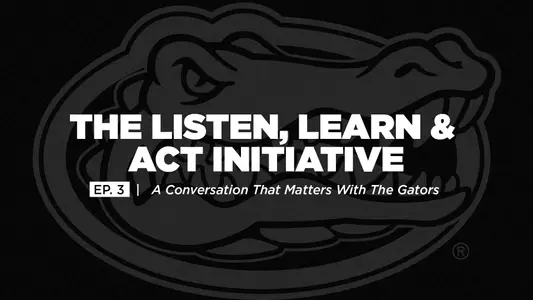
'LLA, Part III': Black in predominantly white sports
Thursday, August 6, 2020 | General, Chris Harry
GAINESVILLE, Fla. — The meet was in Georgia a few years back and Will Davis was taking a shower in the pool locker room after blowing away his competition in the 50-meter freestyle. From behind the curtain, water running, Davis heard a group of guys roll in and commence talking about the race. More specifically, the performance turned in by Davis and his twin brother Isaac.
Did you see those Davis twins?
They're both so big and fast.
And really cut.
Then came this one.
My mom told me they're taking steroids.
Maybe this is a good time to point out that Will and Issac Davis, who garnered All-American and academic honors as freshmen for the Gators last season on the way to a ninth straight Southeastern Conference men's crown, are African-American. Because, after all, there's no way that two Black kids could be that good — legitimately — at swimming, right?
"Yeah, OK, that's why I'm fast," Davis said, recalling the moment. "But I know the truth. I know the hard work I put in."
Davis relived the episode Thursday during the third installment of the University Athletic Association's "Listen, Learn & Act" initiative, a series that has provided a platform for UF student-athletes and coaches to address social injustice. The latest conversation invited 10 Black athletes that play in predominantly white sports to speak to their experiences in swimming, as well as gymnastics, soccer, softball, tennis and volleyball.
Just like the previous two webinars — the first featured the UF men's basketball team; the second 13 of the 16 UF head coaches — the anecdotes demonstrated not only candor on the part of the players, but also vulnerability.
Take tennis standout Marlee Zein. She came to Florida by way of Sugar Land, Texas, where she won the Class 6A singles title in that state and was the No. 6-ranked prospect in her recruiting class. One of her first days on campus, someone had this to say.
"I didn't know Black people played tennis."
She'd heard it before. All of the athletes on the Zoom call, in fact, had dealt with similar scenarios, as well as micro-aggressions that may not seem so micro.

"It's almost like I'm wearing a mask. I know the irony in that. Not a literal mask, but a mask that hides who I am," Hoover said. "It's a mask that allows me to kind of get by in white society. Truthfully, I created this mask to put on in order to feel accepted. It sucks. I hate admitting that. How can any of us really succeed and be the best version of ourselves if we're not being 100 percent ourselves?"
Nya Reed was a superb gymnast through her youth. And while the overwhelming number of athletes competing in the sport are white, Reed never has understood when people mistake her for another African-American gymnast. Like last year. On a football game day, the gymnastics team was signing autographs outside Exactech Arena a few hours before kickoff. A patron told Reed, a sophomore, she looked like Gabby Douglas, the Olympic gold medalist.
She doesn't. Not at all.
"You don't get white people mixed up," Reed said. "Why are you getting us mixed up?"
For her passion, competitiveness and willingness to confront teammates, volleyball's T'ara Ceasar, a fourth-year junior who sat out last season after transferring from Georgia, has been labeled in the past as an "angry black woman." She's been told her actions weren't great traits for a leader.
Since when?
Said Ceasar: "Just because we don't have blonde hair and blue eyes, doesn't mean we can't be leaders."
View the entire webinar below
2025 Florida Hall of Fame - Charlotte Browning | Women's Track & Field/Cross Country 2008-10
Tuesday, October 28
SEC Media Day: Coach Golden on Winning a National Championship in 2025.
Tuesday, October 28
Meet the Gators: The Catching Unit
Friday, October 24
Up Next presented by UF Health (October 24, 2025)
Friday, October 24



